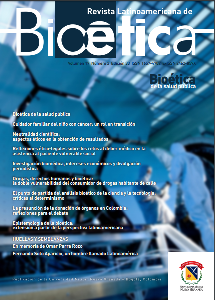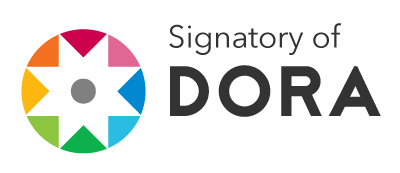Biomedical research, economic interests and journalistic disclosure
Abstract
This article pretends to affirm that all research, especially the biomedical, to be precisely such, must have an ethical dimension. And it enjoys this dimension as long as it goes to the benefit of the human being himself. Without it, we cannot speak of progress in biomedical research. Then, it can only be called “progress” if we speak of an investigation that will benefit each of the human beings. That is, biomedical research must be translated into an advance of the human being into humanity. But unfortunately many times this does not happen. It is called biomedical research to everything, regardless of whether or not it has an ethical dimension, considered as an external instance to it.
This dimension, inserted in the biomedical research itself, is replaced by other interests, especially of an economic nature, especially in artificial human reproduction. So the social media echoes this type of studies in biomedicine. But often the media seek more the emotions of the viewer than their responsibility to convey news strictly and truthfulness.
Downloads
Languages:
esReferences
Agazzi, E. (1992). El bien, el mal y la ciencia. Las dimensiones éticas de la empresa científico-tecnológica. Madrid: Tecnos.
Aznar, J. (2004). Alternativas al uso de células madre embrionarias. En Cayuela, A., Vara, J., Romero, F. J. y Villar, V. M. (Coords.). Ética, bioética y desarrollo: el hombre como ser dependiente (pp. 129-145). Madrid: Comares.
Aznar, J., Jouve, N. y López, N. (2007). Clonación de embriones humanos. En J. Aznar Lucea (Coord.), La vida humana naciente: 200 preguntas y respuestas (pp. 121-128). Madrid: Biblioteca de Autores Cristianos.
Aznar, J., Jouve, N. y López, N. (2007). Las células troncales y su aplicación terapéutica. En J. Aznar Lucea (Coord.), La vida humana naciente: 200 preguntas y respuestas (pp. 145-150). Madrid: Biblioteca de Autores Cristianos.
Aznar, J. y Sánchez, J. L. (2011). Embryonic stem cells: are useful in clinic treatments? Journal of physiology and biochemistry, 67(1), 141-144. DOI: https://doi.org/10.1007/s13105-010-0064-0
Ballesta. F. J. (2011). El equívoco de la esterilidad: ¿enfermedad o manipulación? Revista de Bioética y Derecho, 23, 21-34.
Bilbeny, N. (2014). Ética del periodismo. Barcelona: Universidad de Barcelona.
Ceifer Biobanco (2016). Precios en reproducción asistida: inseminación artificial y FIV. Recuperado de http://www.reproduccionasistida.org/precios-de-tratamientos-de-reproduccion-asistida.
Codina, M. (2002). Contexto actual de la deontología de la comunicación. En Codina, M. (Ed.). Información, ficción, persuasión: ¿Es la ética una utopía? Actas de las XVI Jornadas Internacionales de la Comunicación, Universidad de Navarra, 2001 (p. 312). Pamplona: Eunate.
De Semir, V., Ribas, C. y Revuelta, G. (1998). Press Releases of Science Journal Articles and Subsequent Newspaper Stories on The Same Topic. Journal of the American Medical Association, 280(3), 294-295. DOI: https://doi.org/10.1001/jama.280.3.294
García, J. A. (2001). Autorregulación profesional y estándares en el periodismo audiovisual. En Codina, M. (Ed.). De la ética desprotegida. Ensayos sobre deontología de la comunicación (pp. 69-88). Pamplona: Eunsa.
Gaudlitz, M. (2008). Reflexiones sobre los principios éticos en investigación biomédica en seres humanos. Revista Chilena de Enfermedades Respiratorias, 24, 138-142. DOI: https://doi.org/10.4067/s0717-73482008000200008
González, A. M. (2000). En busca de la naturaleza perdida. Estudios de bioética fundamental. Pamplona: Eunsa.
González, A. M. (2002). Claves éticas para la bioética. Persona y Bioética, 6(15), 57-69.
Institut Català de Fertilitat [Fertilab] (2016). Precios FIV. Recuperado de http://bit.ly/2ts1YMA.
Instituto Valenciano de Infertilidad [IVI] (2016). Selecciona el tipo de tratamiento en el que estés interesado. Recuperado de https://ivi.es/precio-fiv-invitro/.
Jareño, J. (2009). Ética y periodismo. Bilbao: Desclée de Brouwer.
Jouve, N. (2015). Las células madre: alquimia celular para una nueva medicina. Madrid: Palabra.
Laucirica, C. (2007). Ética de la publicación científica. Revista Habanera de Ciencias Médicas, 6(supl. 5), 58-59.
López, N. (2006) Repensar la Ciencia. Madrid: Eunsa.
Maya, J. M. (2001). Ética en investigación biomédica y del comportamiento. CES Medicina, 15(2), 9-20.
Melina, L. (1996). La cooperación en acciones moralmente malas contra la vida humana. En Lucas, R. (Dir.). Comentario interdisciplinar a la Evangelium Vitae. Madrid: Biblioteca de Autores Cristianos.
Pellegrino, E. D. (1974). Humanism in human experimentation: some notes of investigator’s fiduciary role. Texas Reports on Biology and Medicine, 32(1), 311-325.
Serrano, J. M. (2002). Nuevas cuestiones de bioética. Pamplona: Eunsa.
Spaemann, R. (2003). Límites. Acerca de la dimensión ética del actuar. Madrid: Eunsa.












